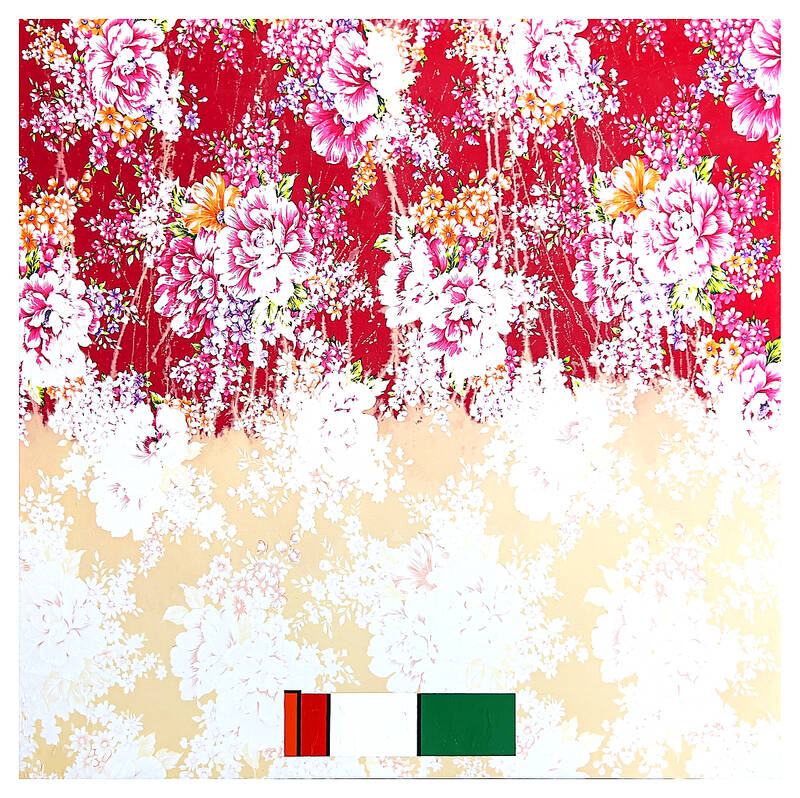During his first Taipei solo show in March, artist Jason Cole Mager exhibited a piece where, for the first time, he used humor to address his usually serious themes exploring Taiwan’s politics and complex history. Titled Cultural Colonization, Have a Nice Day, it depicted repeating symbols of the Japanese rising sun juxtaposed with the logo for the Japanese-owned 7-Eleven.
Based on this single work, Mager has created 23 new pieces for his latest exhibition, “Culture, Company & Consummation” (結·地·企) at Taipei’s Shalon Shalom (你好沙龍). He will discuss his work at the space tomorrow with Kenneth Lin (林志鴻), chief editor of Art Collection + Design magazine.
Having lived in Taiwan for nearly a decade, Mager’s work has become increasingly personal and embracing of local culture, this time incorporating the colorful floral cloth now known as “Hakka fabric” — as his wife is part-Hakka.

Photo courtesy of Jason Cole Mager
Her stories of this fabric being used for bedding, curtains and tablecloths and its eventual wear and tear inspire several paintings that appear to be bleached, creating a painterly space, Mager says. He adds that these works do not necessarily inform the viewer of their source, but encourage discourse as the fabric’s familiarity and alteration raise questions.
Other paintings directly expand on the 7-Eleven theme — one image uses the Chinese characters for “seven” and “eleven,” as Mager questions why the logo, ubiquitous in Asia, is not made to be read by the local community. Another replaces the seven with an eight and the eleven with the word “lucky,” a nod to the local superstition surrounding the number.
-Artist talk tomorrow at 7pm at Shalom Shalom, 3, Ln 165, Xinsheng S Rd Sec 1, Taipei City (台北市新生南路一段165巷3號)

Photo courtesy of Jason Cole Mager
-Exhibition runs until Nov. 5

In the March 9 edition of the Taipei Times a piece by Ninon Godefroy ran with the headine “The quiet, gentle rhythm of Taiwan.” It started with the line “Taiwan is a small, humble place. There is no Eiffel Tower, no pyramids — no singular attraction that draws the world’s attention.” I laughed out loud at that. This was out of no disrespect for the author or the piece, which made some interesting analogies and good points about how both Din Tai Fung’s and Taiwan Semiconductor Manufacturing Co’s (TSMC, 台積電) meticulous attention to detail and quality are not quite up to

April 21 to April 27 Hsieh Er’s (謝娥) political fortunes were rising fast after she got out of jail and joined the Chinese Nationalist Party (KMT) in December 1945. Not only did she hold key positions in various committees, she was elected the only woman on the Taipei City Council and headed to Nanjing in 1946 as the sole Taiwanese female representative to the National Constituent Assembly. With the support of first lady Soong May-ling (宋美齡), she started the Taipei Women’s Association and Taiwan Provincial Women’s Association, where she

Chinese Nationalist Party (KMT) Chairman Eric Chu (朱立倫) hatched a bold plan to charge forward and seize the initiative when he held a protest in front of the Taipei City Prosecutors’ Office. Though risky, because illegal, its success would help tackle at least six problems facing both himself and the KMT. What he did not see coming was Taipei Mayor Chiang Wan-an (將萬安) tripping him up out of the gate. In spite of Chu being the most consequential and successful KMT chairman since the early 2010s — arguably saving the party from financial ruin and restoring its electoral viability —

It is one of the more remarkable facts of Taiwan history that it was never occupied or claimed by any of the numerous kingdoms of southern China — Han or otherwise — that lay just across the water from it. None of their brilliant ministers ever discovered that Taiwan was a “core interest” of the state whose annexation was “inevitable.” As Paul Kua notes in an excellent monograph laying out how the Portuguese gave Taiwan the name “Formosa,” the first Europeans to express an interest in occupying Taiwan were the Spanish. Tonio Andrade in his seminal work, How Taiwan Became Chinese,